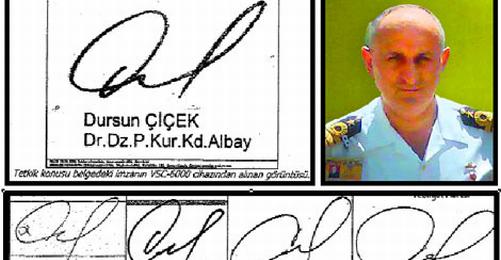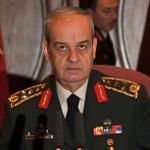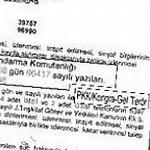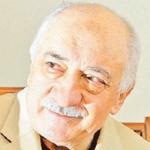The discussion about the "Action Plan against Reactionary Forces" started in June 2009 upon a news item in the Taraf daily. The issue came to head when the original document emerged together with a letter containing classified information of a whistle-blower, allegedly a military officer.
12 June: In the context of the Ergenekon case Taraf newspaper reports about a document showing alleged plans to discredit the ruling Justice and Development Party (AKP) and the religious movement led by Fethullah Gülen. The daily states that the document was signed by Colonel Dursun Çiçek.
15 June: The Association of Human Rights and Solidarity for Oppressed Peoples (MAZLUM-DER) files a criminal complaint against Chief of General Staff İlker Başbuğ and colonel Çiçek based on the contents of the news item.
16 June: Prime Minister Recep Tayyip Erdoğan comments, "If the allegations are wrong they are very serious; if they are true the issue is even more serious. We will open a trial". Onur Öymen from the Republican People's Party (CHP) said, "This is not an arrogating situation for the General Staff, but the establishment is being frayed".
17 June: AKP applies to the prosecutor's office upon the document which allegedly contains "a plan to drive the party away from power by false accusations and undemocratic means"; AKP demands to find the responsible people and prosecute them.
18 June: The lawyers of retired lieutenant and lawyer Serdar Öztürk, who allegedly found the document, filed a criminal complaint against the prosecutors of the Ergenekon case and police officials because " suspicious documents that had not been handed to the lawyers leaked to the press".
22 June: The headlines are dominated by the question whether Çiçek actually signed the document or not. Democratic Society Party (DTP) member Hasip Kaplan demands an investigation commission concerned with the military's memorandums in parliament containing entries on opening of files and a coup.
24 June: The media speculates why colonel Çiçek has not been deposed from duty yet. The General Staff Military Prosecutor announces the result of the investigation: The document has not been prepared within the General Staff. There is no original version. Therefore, there is no legal basis for an investigation. The file is sent to the Istanbul Chief Prosecutor. Meanwhile, speculations arise why Çiçek used a different signature to sign his statement before the prosecutor.
Months later in a declaration made on 26 October, the public is informed that Çiçek had been deposed from duty during the investigation process and was temporarily appointed to the Academic Council of the Anti-Terror Centre. On 4 September he had been appointed to the Navy Command Headquarters.
25 June: The Prime Minister comments, "I hope the Turkish Armed Forces (TSK) will do what is necessary".
Başbuğ calls the document 'a piece of paper'
26 June: The General Staff Directorate holds a press conference. It is said that the document is not authentic but just a "piece of paper". The General Staff demands to find the perpetrators who worked out the "false document" and claims that "an asymmetric psychological operation against the military is being carried out via the media". In October the prosecutor received a letter from a whistle-blower, and an officer, who also sent the original document, claims in this letter that Başbuğ held the meeting after he believed that the original document was not at the General Staff.
Albay Çiçek arrested and released within 1 day
30 June - 1 July: In the context of the Ergenekon investigation the prosecutors take the statements of Colonel Çiçek, Muharrem Nuri Alacalı from the Gölcük Naval Command, Şafak Yürekli and İbrahim Koray Özyurt from Aksaz Naval Base Command, Colonel Dora Sunguray from the Marine Forces Command, Mert Yanık from the Naval Command Academy, Levent Görgec from the Naval Training Command, Tayfun Duman from the Gölcük Warfare Squadron Command Group and retired Marine Colonel Aydın Odabaşı. A duty high criminal court in Istanbul arrests Çiçek in the night of 30 June and he is taken to the Hasdal Military Prison. However, in a surprise development less than 24 hours later, the same high criminal court, this time with three judges rather than one duty judge, decides to release the colonel.
In the meantime, the Contemporary Journalists Association (ÇGD) and the Press Institute Association (IPI) criticizes Başbuğ for blaming the media.
Journalists on trial
22 July: Colonel Çiçek files criminal complaints against Star and Taraf newspapers because of news related to the document.
14 September: Taraf journalist Mehmet Baransu, who wrote the initial news item about the document, finds out that upon the General Staff's complaint a trial has been opened against him under charges of "publicly insulting the military forces". General Staff Legal Advisor Brigadier General Hıfzı Çubuklu had announced on 11 September that a court case had been opened against a journalist in connection with the document but did not give any name.
Document turns out to be authentic
24 October: The Taraf newspaper reports that an officer has sent the original document and another document entitled "Information Support Plan" to the prosecutors together with a letter from the secret informant on 30 September. According to Hürriyet newspaper, on 19 October the Forensic Medicine Institute confirmed that the document had been signed by Colonel Dursun Çiçek.
The General Staff announces on their website that the reactions about the letter are exaggerated and criticises that the media is not the right place to discuss this issue.
In the letter from the secret informant it is stated that Başbuğ was aware of the document and that it was worked out upon the instructions of former Vice-Chief of General Staff Hasan Iğsız. It is furthermore said that on the day of the news 40 computers were "cleaned" in order to destroy further evidence.
25 October: Exiting a cinema, Chief of General Staff İlker Başbuğ answers a few questions from journalists regarding politics on the Kurdish question. Yet, when he is asked about the document he comments, "this is not our topic".
General Staff: New investigation into the "piece of paper"
26 October: On his way from Pakistan to Iran Prime Minister Erdoğan tells journalists in the plane that he will talk to Başbuğ about the issue and says that he hopes the document was not authentic, "nobody should worry about the truth to emerge".
In the evening hours of the same day the General Staff issues another announcement on its website, declaring that a new investigation has been launched. Once more they voice their concern about the new information being published in the media first and demand to prosecute the ones responsible for the leaking to the press.
27 October: As reported by Taraf daily, on 21 October the prosecutors asked the General Staff to send 5 of the 6 soldiers involved in the destruction of evidence to the prosecutor's office within 24 hours to take their statements. However, there is still no response. According to Taraf, the prosecutors prepared a criminal complaint. However, the statement of the 6th soldier, who was discharged, confirmed the incident. The daily also mentions that the names given in the statement overlap with information from the whistle-blower's letter.
Furthermore, the newspaper reported that military prosecutor Yavuz Şentürk, who had ruled for a nolle prosequi before, met Istanbul Public Chief Prosecutor Aykut Cengiz Engin on 23 October. Apparently, he told him "The soldiers will not be sent" and "Close the investigation". (TK/VK)




















